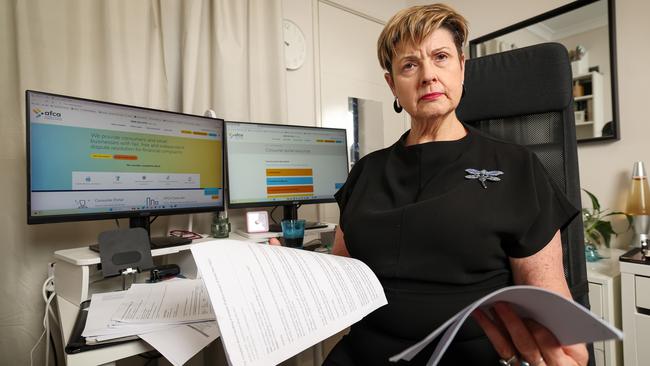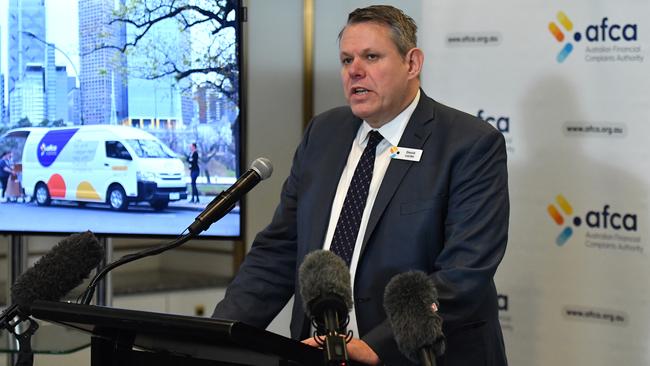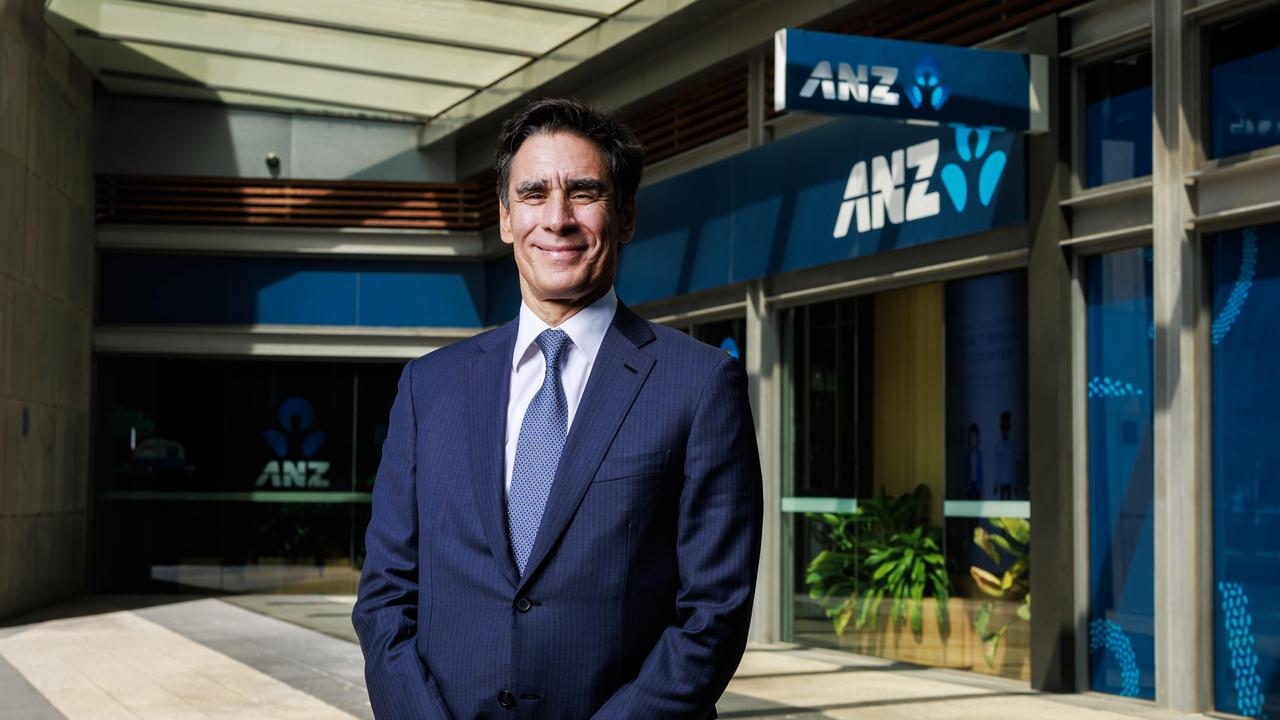AFCA complaints backlog leading to lengthy waits for case assessment
Aggrieved banking, insurance and super customers are suffering delays of up to six months to have managers assigned to complaints at the peak financial dispute resolution body.

Business
Don't miss out on the headlines from Business. Followed categories will be added to My News.
Aggrieved banking, insurance and superannuation customers are suffering lengthy delays of up to six months to have case managers assigned to complaints at the nation’s peak financial dispute resolution body.
Complainants and lawyers are reporting protracted delays in having matters progressed through the dispute resolution scheme, the Australian Financial Complaints Authority (AFCA).
Set up in late 2018, AFCA has replaced the Financial Ombudsman Service, the Credit and Investments Ombudsman and the Superannuation Complaints Tribunal.
The reported delays come as AFCA – which is not a regulator, although it can refer matters to them – is set to receive further responsibility if the federal government gets the new Scams Prevention Framework through parliament. That would put scam complaints squarely within AFCA’s remit, while social media giants and telecommunications companies would become members of the dispute resolution body and subject to a levy.
Perth-based human resources professional Sandra Mutch is among the complainants frustrated with AFCA’s processes. She lodged a complaint relating to an insurance broker with AFCA in July, and was told in December that her matter would be allocated to a case manager within six weeks.
“It’s been very slow moving. It’s almost glacial at the rate that it’s moving. Frustrating in the dealing with the insurance broker, but glacial in the movement that has happened once I contacted AFCA, except for a mad rush at the end,” Ms Mutch said in an interview.
Her matter emerged after her building’s strata insurance renewal notice ended up in her junk email folder, meaning she didn’t address it before the due date. When she noticed and tried calling and emailing the broker at Arthur J Gallagher, she couldn’t get on to anyone and her queries went unanswered.
“What sort of business doesn’t return calls or emails for something like insurance that has a clear deadline and a clear due date?” Ms Mutch said.
She eventually trawled LinkedIn to find someone at Arthur J Gallagher who might answer the phone in an attempt to resolve the matter, before shifting her policy to a different insurance broker and provider. The stress and angst of having lapsed insurance and not being able to quickly rectify the issue prompted her to lodge a complaint with Arthur J Gallagher and then AFCA.

The matter was assigned to an AFCA case manager in late January after Ms Mutch provided further information to AFCA in the earlier part of January. Her AFCA dashboard informs her the next stage could take 10 weeks to be finalised, based on the timeline for similar complaints.
The drawn-out time frames on some AFCA matters come after its 2023-24 annual report showed complaints ballooned to almost 105,000, a record and up 8 per cent on the prior year. The record levels were underpinned by more matters relating to scams, financial hardship and general insurance, while there was also a spike in legacy consumer credit insurance complaints and matters related to superannuation.
The AFCA report put the average time to close a complaint at 74 days last financial year, but anecdotal evidence suggests the wait can be significantly longer. The average number of days to close a matter includes complaints that are assessed and deemed out of AFCA’s jurisdiction or scope.
AFCA’s revenue – which includes annual fees paid by financial companies as members, user charges, complaint fees, interest income and grants – amounted to $179.4m in the 12 months ended June 30. Expenses totalled more than income, meaning AFCA ran at a deficit of $3.1m last financial year.
Complaints typically sit with AFCA because they have failed to be resolved within the internal dispute resolution processes of financial institutions such as banks, super funds and insurers.
Jazmine Saylon said her complaint regarding a superannuation income protection payout through her AustralianSuper account has languished at AFCA since she first lodged it in early December 2023, a year after first submitting her complaint to insurer TAL.
She said she first heard back from AFCA four months later, in April 2024, and while the case has had a preliminary assessment it is awaiting the next stage at the disputes body.
AFCA told Ms Saylon in November last year there would be a delay in even allocating a person to determine her complaint, warning timelines to find an ombudsman had blown out to 23 weeks.
Ms Saylon told The Australian her suffering was being prolonged by the saga, noting it was even more dispiriting given her prior car finance role involved dealing with AFCA and customer complaints. “In an ideal world, this would be resolved by now,” she said. “I’ve actually lost faith in the system.”
Lack of staff
Principal at law firm Berrill & Watson, John Berrill, said AFCA was facing a backlog of cases. He said several of his clients had faced delays of three or four months before an initial assessment of their complaint was made. That is only the first step in the dispute body’s process.
Consumer lawyer and consultant David Niven said AFCA’s process was slow by its nature and complainants could be caught up in it for some time, particularly for complex matters.
“They (AFCA) don’t have enough experienced people, they don’t have enough people generally,” he added. “I’m troubled by the lack of consistency in their decisions and the lack of legal principles applied … The system is not good at getting to the truth.”
AFCA chief executive and lead ombudsman David Locke acknowledged the record levels of complaints had put “pressure on the system”.
“I’m mortified that people are in those circumstances,” he said of the delays and distress some complainants were experiencing. “It’s the last thing I want, and we’re doing everything we possibly can to address that.”
Mr Locke said AFCA was recruiting new staff, doubling down on training employees and deploying teams in periods of peak complaints on fixed-term contracts to deal with the delays.
“There’s no quick fix,” he added. “In some circumstances, the delays have been much longer than we consider is acceptable or desirable. They’re coming down. The good news is that we’re making really good progress, but I accept delays cause huge frustration, distress and anxiety.”
Ms Saylon said she was concerned people who didn’t have legal assistance in dealing with AFCA would simply “give up”.
“It will be the client who suffers at the end,” she said. “Every dollar nowadays will count towards that for me. That’s the biggest impact at the end of the day.”
Assistant Treasurer Stephen Jones, who is retiring from politics at the upcoming election, said he expected AFCA to operate in “a fair, effective and efficient way”.
“That’s written into their charter and written into the law. On the whole, I think they move through a large body of complaints, sometimes in difficult circumstances, but there are some complaints that are taking a lot longer than we would like to be resolved,” he said.
Mr Jones said in some complicated matters delays were to be expected for customers to get the right outcomes. He cited AFCA complaints regarding HSBC and an impersonation scam where many customers were duped. The AFCA ruled overwhelmingly in favour of the complainants.
“The customers at the end of the day would have been happy with the result. They would have liked it quicker. But they got the right result,” Mr Jones said.

ASIC has taken up that matter and is suing HSBC in the Federal Court, alleging the bank didn’t have adequate controls and failed to “adequately protect customers” who were scammed out of millions of dollars. Mr Niven, who represented some of the HSBC customers, said one woman had spent almost two years in the AFCA process, while several others had taken about a year. He agreed that in some cases it was better for them to be drawn out and thorough, if the additional time led to better outcomes.
Mr Jones said AFCA had reported 77 systemic issues and nine possibly serious legal breaches to authorities including the Federal Police and Australian Securities & Investments Commission.
Opposition assistant Treasury spokesman Luke Howarth said his office regularly received complaints from constituents about AFCA’s timeliness and processes.
“AFCA and its staff should be working as productively and efficiently as possible to ensure it processes complaints and reaches a decision in a timely manner,” he said.
“Under the Albanese government AFCA is becoming the ombudsman for everything, with the matters it is responsible for expanding and straining its resources. AFCA is now dealing with more complex complaints relating to issues like the Consumer Data Right and the Compensation Scheme of Last Resort, and will soon have an influx of scams complaints.“
Tom Jordan, a retired police officer who has a dispute with National Australia Bank, drew on the assistance of then federal member Stuart Robert to get AFCA to assess his matter.
“AFCA sweeping this under the mat was so significant from an external dispute resolution group who are supposed to be out there minding the Fort Knox,” he said. “They’re meant to be out there protecting the consumers, the people out there who are badly done by … Not the rich ones, but the people like myself and small business.
“The problem is that we only have one place to go to.”
Mr Jordan’s complex complaint went all the way through AFCA’s processes and even to an independent assessor that reviews complaints about the standard of AFCA’s service provision.
“In total I had 34 months, nearly three years (of the complaint being with AFCA) … An absolute joke,” he said.
The AFCA ombudsman and independent assessor’s rulings went against Mr Jordan, although he continues to explore legal options to take the matter to court.
Mr Berrill said any attempts to suggest AFCA was otherwise coping with the deluge of complaints being heaped on it were wrong.
“That’s the reality, They can hardly deny it,” he said.
Mr Berrill said AFCA’s timelines had grown worse over recent years, pointing to the rise of scams and fraud as well as a backlog of insurance matters related to the 2022 floods as increasing the workload at the body.
Mr Berrill also noted AFCA’s “manpower problem” and said the increase in staffing at the disputes body not matching its increase in work.
“They’re chasing their tail as new things come on board and as the government gives them more power,” he said.
AFCA has increased its headcount by 40 per cent to some 1200 employees during the 2023 and 2024 calendar years.
Sharing the blame
Mr Locke was clear that some of the blame for the swelling AFCA case load had to fall on financial institutions not appropriately dealing with customer complaints.
“The primary responsibility for handling disputes sits with the financial firms,” he said. “We have been talking to insurers, we’ve been talking to super funds, we’ve been talking to others saying … just because the case has been lodged with AFCA, you should now be resolving the matter.
“You want firms to be resolving these issues upfront, or ideally not creating the issue in the first place by improving their service standard.”
Mr Berrill agreed the financial sector shouldn’t be given a free pass over the problems at AFCA. She said if companies were better at resolving their complaints internally less work would be piled on the disputes body.
The corporate regulator released a report in December urging financial firms to foster “a positive complaints management culture that delivers quality outcomes for consumers,” alongside quality internal dispute resolution data. ASIC signalled it was closely examining the standard of internal dispute resolution reporting and undertaking activities “to strengthen compliance” with the mandatory regime.
ASIC also found insurers were failing to identify one in six complaints, meaning customers were not being afforded protection through internal dispute resolution avenues.
Mr Locke said AFCA was prioritising certain types of cases which were deemed more important. They included cases where a complainant’s home was damaged by a natural disaster, they suffered from mental health issues, had been scammed or were in financial hardship.
“With scams and people in financial hardship, we’re allocating matters within two weeks, sometimes much quicker than that, but it does mean in some other areas there have been much longer delays than I would like,” Mr Locke said.
He cited AFCA data that shows 87 per cent of complaints were resolved within six months last financial year.
In October, the federal government earmarked $14.7m to AFCA over two years relating to the Scams Prevention Framework and dispute resolution.
“The new jurisdiction that we’re going to give them, we acknowledge that it’s a big new step up,” Mr Jones said. “They’re already getting a huge volume of scams complaints, about 5000 a year … That will go up.
“We acknowledge there’ll be a greater caseload.”
Mr Locke said AFCA was undertaking preparatory work around the new framework.
“We’re mapping out how this could work. We’re testing scenarios. We’re engaging with stakeholders,” he added. “We’re looking at what’s been done internationally.”
More Coverage
Originally published as AFCA complaints backlog leading to lengthy waits for case assessment



